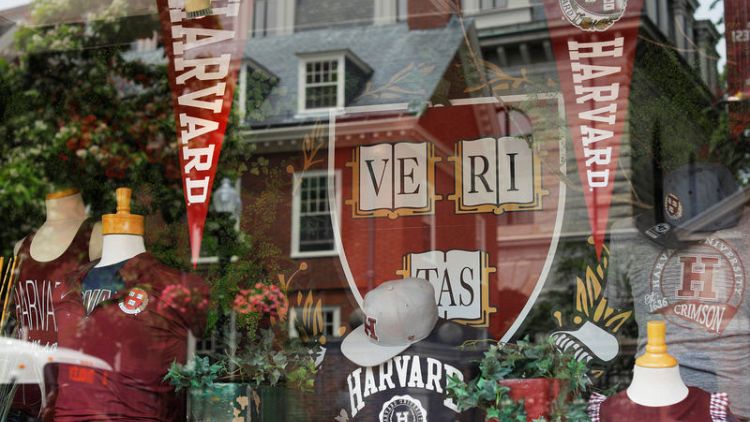By Nate Raymond
BOSTON (Reuters) - The U.S. Justice Department on Thursday threw its support behind a lawsuit accusing Harvard University of discriminating against Asian-American applicants, saying the Ivy League school's race-based admissions process disadvantaged them.
The department, which has been investigating Harvard for potential civil rights violations, made its argument in documents filed in federal court in Boston, where a trial over a lawsuit on alleged bias is due to begin in October.
The Justice Department argued that Harvard had failed to establish that its use of race as a factor in deciding which students to admit had not resulted in it illegally discriminating against Asian-Americans.
Instead, the department said the evidence in the lawsuit by Students for Fair Admissions showed Harvard's admissions process "significantly disadvantages" Asian-Americans compared with other groups.
"No American should be denied admission to school because of their race," U.S. Attorney General Jeff Sessions said in a statement.
Harvard did not respond to requests for comment. It has defended its admissions practices as consistent with the law and necessary to promote student diversity.
Supporters of Harvard, including the American Civil Liberties Union, assailed the Trump administration's decision to intervene in the case, with some calling the Justice Department's position an assault on efforts to promote campus diversity.
The U.S. Supreme Court has ruled that universities may use affirmative action to help minority applicants get into college. Conservatives have said such programs can hurt white people and Asian-Americans.
In 2016, the top court rejected a challenge to a University of Texas program designed to boost the enrollment of minority students, which was brought by a white woman.
SFFA is headed by prominent anti-affirmative action activist Edward Blum, who found the woman in the 2016 case. Harvard has called SFFA a "litigation vehicle designed to advance the ideological objectives of its founder."
After Republican President Donald Trump took office last year, the Justice Department began investigating whether Harvard's policies are discriminatory because they limit Asian-Americans' acceptance.
In court papers, SFFA claimed an Asian-American male applicant with a 25 percent chance of admission would have a 35 percent chance if he were white, 75 percent if he were Hispanic and a 95 percent chance if he were black.
SFFA said in 2013, a Harvard research division found that over a decade, Asian-American admission rates were lower than those for whites annually even though whites outperformed Asian-American applicants only on a subjective personality rating.
(Reporting by Nate Raymond; Editing by Scott Malone and Dan Grebler)
